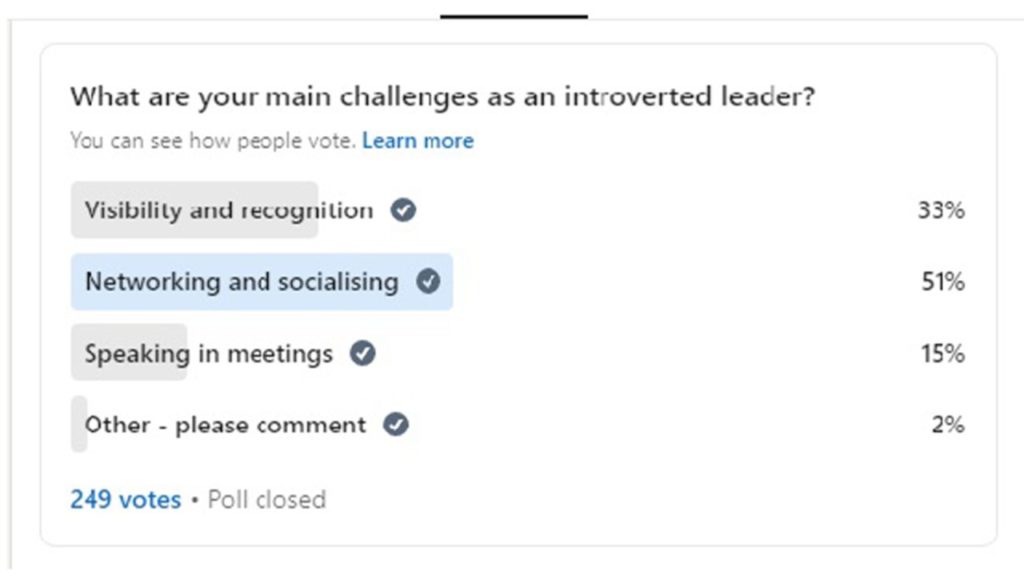The results of my poll asking what the top challenges are as an introverted leader are in. Out of the four options given, networking and socialising got the most votes at 51%.
Last week, I wrote about Why Introverts Don’t Like Networking and What You Can Do About It, this week I am focusing on developing the confidence to network and socialise if you are introverted and lack confidence or you are shy. I briefly covered developing confidence in last week’s newsletter, but this week I dig deeper.
Before I continue, I want to make it clear that lacking confidence and being shy are not synonymous with introversion. Extraverts can lack confidence and be shy too. The purpose of this edition of the newsletter is to equip those introverts who also lack confidence and are shy with the tools and techniques to develop confidence in networking and socialising.
I am aware that some people would have loved to come to the conference for introverted leaders on 13 September in London, but a lack of confidence was holding them back from booking.
If this applies to you, there are so many benefits for you to gain from attending the conference, so I hope what I share here will help.
There are many reasons why someone lacks confidence in networking and socialising. Often at the root of it is fear. This could be a fear of rejection, fear that you won’t be able to engage with others, fear that you won’t have anything interesting to say, fear of failure, fear of being judged, self-doubt and fear that you are not interesting or accomplished enough to add value.
There could be other factors such as cultural barriers or socio-economic barriers. If you are from a different cultural or socio-economic background to the majority of the group, you may feel like you don’t belong or that you are not as good as the others. Feeling like this can have a negative effect on your confidence.
Looking at the people who are going to be there and thinking that they are more successful, accomplished, or better than you, can make you feel like you are not good enough or worthy enough.
And when you are introverted and don’t enjoy making small talk, and find networking and social environments overstimulating, and any of the above applies, this can make the experience even worse.
If you want to progress in your career, have more influence as a leader, identify opportunities, bring in new business, and much more, there are many benefits to be gained from networking which can help with all of these.
Additionally, if you don’t develop your network, you could miss out on opportunities that arise in the hidden job market. That is those positions that are filled through referrals and word of mouth. The exact number of jobs that are filled this way is unknown but having a good network enables you to become aware of opportunities, as well as being front of mind to approach when opportunities arise.
Identify what your fear is
What is it that you worry about when it comes to networking or socialising? What do you think will happen? If you have an event coming up and are starting to feel anxious about it, check what thoughts about it are going through your mind and what it is you are worrying about.
Challenge what you think and believe about it, look for the evidence to support your beliefs and dispute what you think and believe. Rationalise the situation and identify a more helpful perspective to have about it.
For example, Jane didn’t go networking because deep down, she didn’t think that she was as good as her peers and others within the sector in which she worked. She came from a disadvantaged socio-economic background, and she was the first in her family to go to university.
She worked in an environment with a lot of people who were from privileged backgrounds and Oxbridge educated. She experienced imposter syndrome and believed she would get found out that she wasn’t good enough.
Jane was going into these networking environments lacking psychological privilege. She was putting others on a pedestal, thinking that they were better than her. As such, she was not viewing herself on an equal basis.
Challenge and change your beliefs about networking and socialising
By unconsciously doing this, Jane was giving away her power and putting herself at a disadvantage. Addressing this required her to challenge her deeply held beliefs about coming from a disadvantaged socio-economic background meaning that you were not good enough.
Psychologically taking her peers off the pedestal she had placed them on and focusing on the positives she had gained from growing up in the environment she did, helped her to see that she was just as good as them. This perspective removed the anxiety she had about networking and socialising, and she felt more confident doing it. Don’t compare yourself to others and put yourself down in the process.

So back to you. If you change what you think and believe about networking and socialising, you will change how you feel, if you change how you feel, it will help you to change how you act and behave, and you will be able to go about it more confidently.
Like with anything we’re not confident about, the more you practice it, the easier and better it gets. So, as well as changing what you think and believe to remove the fear and self-doubt, the more you network and socialise, the more experienced you become and the more confident you will feel.
If you lack confidence in networking and socialising, how will you apply what I have shared? If you have overcome a lack of confidence when networking I would love to hear how you did this, so let me know in the comments. Sharing your experience might help someone else who is reading this.

